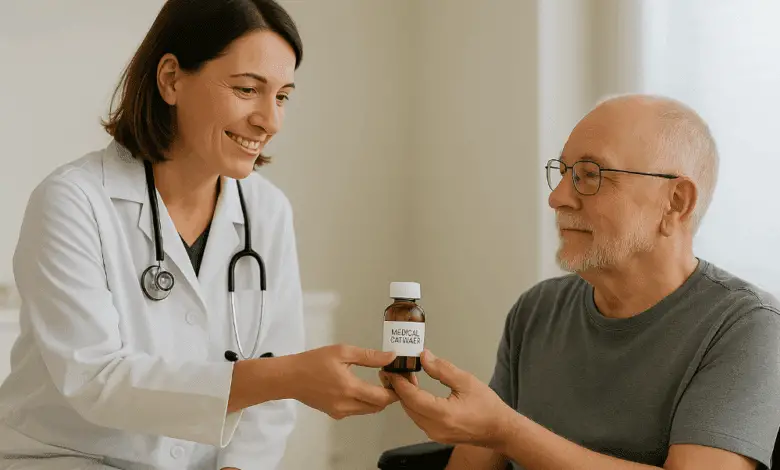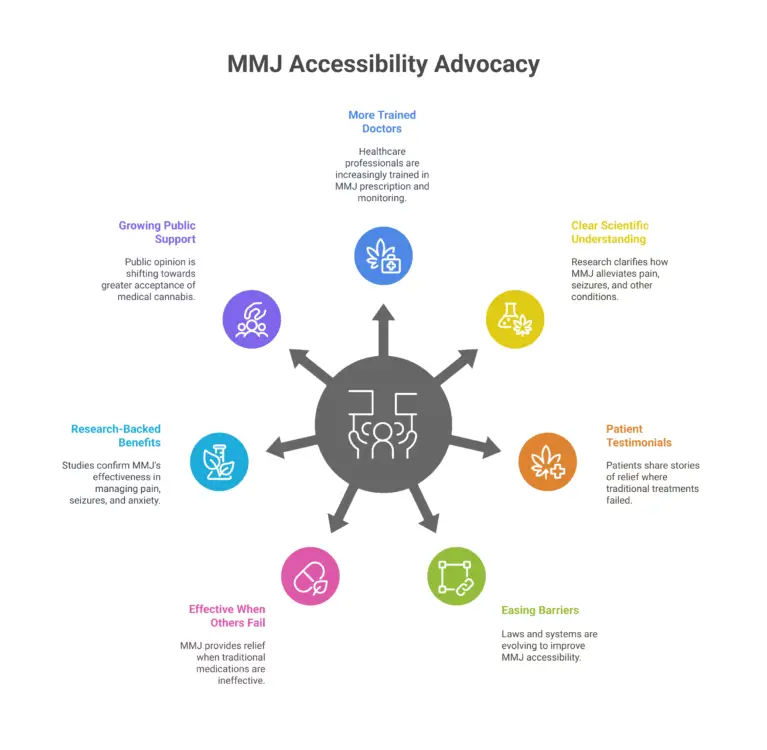
7 Compelling Reasons to Advocate for MMJ Accessibility
Medical cannabis—sometimes called medical marijuana (or MMJ)—is a type of medicine made from the cannabis plant. Some people use it to help manage long-term pain, seizures, or the side effects of serious treatments like chemotherapy. It’s not a cure, but for some, it offers real relief when other options haven’t worked. Here we look at some of the reasons why we should advocate for wider access to this helpful medicine
Key Takeaways
| What | Why it matters |
|---|---|
| Medical cannabis is used to treat health problems | It may help with pain, seizures, and nausea |
| More research is being done | Scientists are finding out how well it works |
| It’s becoming easier to get | Laws are changing and doctors can prescribe it |
| You might know someone it could help | It could be useful for you or someone close to you |
What Can MMJ Help With?
Some doctors use medical cannabis to help with:
- Chronic pain – pain that doesn’t go away, like back pain or joint pain.
- Seizures – sudden shaking that can be hard to stop.
- Feeling sick during cancer treatment – some people feel less sick when they use it.
7 Compelling Reasons to Advocate for MMJ Accessibility
Medical marijuana is steadily gaining traction as a valuable tool for healthcare.
Patients speak of its effectiveness, and more and more research supports its therapeutic potential. Barriers to prescription are being revised, paving the way for more people to receive it as treatment for their health conditions.
Why should this matter to you? With chronic pain relief, seizure management, and other health solutions tied to it, medical cannabis could apparently help millions lead healthier lives.
Curious about these advantages? Keep reading as we look at the compelling reasons why wide availability makes sense!

1. Doctors Now Increasingly Specialise in Medical Marijuana
Since cannabis first became recognised as a prescription medicine, the need for medical expertise has grown on both sides of the Atlantic. In the US, physicians undergo specialised training to understand cannabis uses, dosages, and potential side effects.
These professionals bridge the gap between anecdotal benefits and clinical application by guiding patients through personalised treatment plans. A tailored approach here ensures safer outcomes for conditions like chronic pain, epilepsy, or PTSD.
In the UK, the landscape is more restrictive but evolving. Since medical cannabis was legalised in November 2018, only specialist doctors can prescribe cannabis-based products for medicinal use (CBPMs). These specialists must be on the General Medical Council’s specialist register and typically work in areas like neurology, paediatrics, or palliative care.
Specialists streamline access too. Providers like Veriheal help connect patients to a medical marijuana doctor while offering a medical marijuana card to simplify appointments online. In the UK, private consultations are available through clinics such as Sapphire Medical or Curaleaf, though patients often face significantly higher costs due to limited NHS availability.
2. How MMJ Works Is No-Longer Concealed Science
A decade ago, very little was known publicly about cannabis’ medical properties beyond stereotypes. Now, science has demystified its effects on the body.
Cannabinoids like THC and CBD interact with our endocannabinoid system, which helps regulate pain, mood, and inflammation. Researchers study these interactions extensively today – documenting evidence for seizures, anxiety relief, and chronic pain management.
Public awareness grows as studies become freely available online through platforms like PubMed, bridging knowledge gaps once widened by stigma. In the UK, organisations like Drug Science and the Centre for Medicinal Cannabis conduct research, while institutions like Imperial College London and King’s College London are conducting important clinical trials.
3. Tons of Testimonials Support Its Effectiveness
From cancer patients in chronic pain to people dealing with mental disorders like PTSD, medical marijuana’s impact is profoundly personal and real across both countries. Patient stories show its value beyond statistics or studies.
Notable US Cases:
- Charlotte Figi: A young girl whose severe epilepsy inspired CBD oil awareness after reducing her seizures dramatically.
- Patrick McClellan: Has dystonia, he advocates for medical cannabis and has said it has a “remarkable effect” on reducing muscle spasms and pain.
UK Patient Stories:
- Alfie Dingley: A young boy with severe epilepsy whose family campaigned for medical cannabis access, leading to one of the first NHS prescriptions in England
- Joanne Griffiths whose son Ben has intractable epilepsy, is a prominent medical cannabis campaigner and the director of End Our Pain, an advocacy group working to improve access to medical cannabis in the UK.
4. Barriers to Accessibility Are Falling Across States and Countries
United States: Some states are easing old rules, making it easier to get medical cannabis. Places like New York and Maryland have cut red tape around doctor sign-offs and dispensary access. Many programs now offer lower costs for people who qualify, and online appointments mean you can speak to a provider from home—no long wait times or complicated steps..
United Kingdom: Progress is slower but significant. While medical cannabis was legalised in 2018, NHS prescriptions remain limited to specific conditions like severe epilepsy, multiple sclerosis spasticity, and chemotherapy-induced nausea.
5. MMJ Offers Relief Where Traditional Medications Fail
This remains true across both healthcare systems. For chemotherapy patients dealing with nausea, opioids often fall short while cannabis eases discomfort effectively. In the UK, this is one of the few conditions where NHS prescriptions are more readily available.
Conditions like multiple sclerosis see improved spasticity control through THC-based therapies when standard prescriptions underdeliver – Sativex, a cannabis-based medicine, is actually licensed in the UK for MS spasticity. PTSD sufferers in both countries find relief with medical cannabis after years of anxiety medications leaving symptoms unresolved. For PTSD, real-world data suggest benefits for many patients, but the evidence is not as definitive, and more research is needed.
The UK’s National Institute for Health and Care Excellence (NICE) has approved specific cannabis medicines for certain conditions, though their criteria remain strict compared to many US states.
6. Studies Show Broad Benefits for Specific Conditions
Research from both countries demonstrates medical cannabis benefits for various conditions:
- Chronic Pain: UK and US studies reveal THC and CBD reduce inflammation, alleviating discomfort from arthritis or back pain. The UK’s Faculty of Pain Medicine has acknowledged cannabis’s potential role in pain management.
- Epilepsy: CBD oil minimises seizure frequency in treatment-resistant cases like Dravet syndrome. This was crucial in the UK’s initial legalisation decision, following high-profile cases like Alfie Dingley and Billy Caldwell.
- Anxiety Disorders: Research from both countries shows cannabidiol promotes relaxation without sedative side effects of traditional drugs.
Medical cannabis is being used where standard treatments often fall short or cause heavy side effects. It’s guided by real data, not guesswork, and can be tailored to what each person needs.
7. Growing Acceptance Reflects Shifting Social Norms
Cannabis used to be weighed down by stigma in both countries, hiding its possible benefits. But as people learn more and see it in practice, old myths are giving way to people realising the actual medical benefits of its use.
United States: Medical use paved the way for wider acceptance, with states like Minnesota legalising recreational cannabis in 2023, showing mainstream acceptance across generations and political divides.
United Kingdom: While recreational cannabis remains illegal, medical acceptance grows steadily. Polls consistently show majority support for medical cannabis access, and high-profile endorsements from medical professionals and politicians have shifted public opinion. Organisations like the Royal College of Physicians have called for further research and consideration of policy changes.
Cross-party political support is emerging, with MPs from Conservative, Labour, and Liberal Democrat parties supporting expanded medical access.
Responsible MMJ use and support
While MMJ offers significant therapeutic benefits, long‑term or unsupervised use can occasionally lead to dependence, particularly for people effectively self‑medicating without specialist input. In situations where someone struggles to cut down or stop, talking to their prescribing clinician or GP should be the first port of call, and in more severe cases and in more severe cases, seeking specialised marijuana addiction treatment with personalised rehab can help manage any withdrawal symptoms safely and protect day-to-day wellbeing.
Final Thoughts
Medical cannabis reform in the UK and US is reshaping how we think about care. In the US, dispensaries have expanded access quickly. The UK is moving more slowly, with a focus on clinical evidence and specialist-led prescribing.
Each system reflects different priorities, but both are moving in the same direction: recognising cannabis as a valid medical option. For many patients, this shift brings new hope—and a path to safer, more personalised treatment.